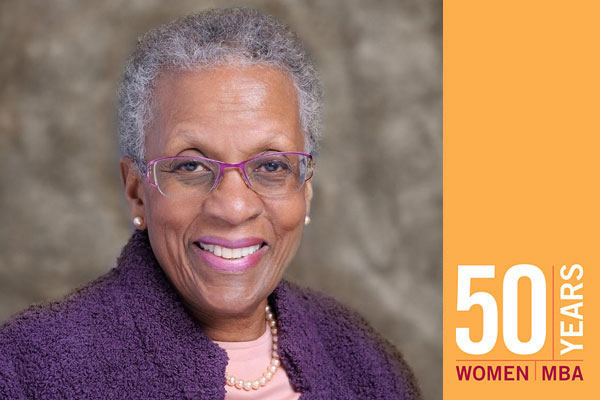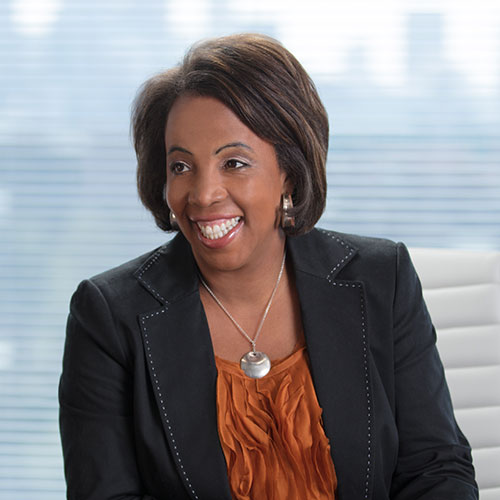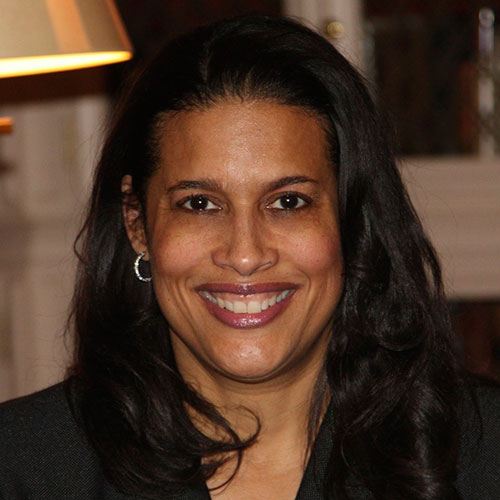
Adrienne Farrar Houël
Biography
Adrienne Farrar Houël is president and CEO of Greater Bridgeport Community Enterprises, Inc. (GBCE), a nonprofit community development corporation founded in 2007. GBCE develops nonprofit sustainability enterprises to create jobs for disadvantaged area residents; assists small and minority businesses to develop green products and programs; researches trends in green business development; has trained and placed low- and moderate-income residents in green jobs; and advocates for more green economy jobs in the Bridgeport area and throughout the state of Connecticut.
What impact did HBS have on your life and the life of others?
The impact that my MBA from Harvard has had on my life has everything to do with the kind of analysis we were taught to apply to business problems. In fact, the case studies and WACs [Written Analysis of Cases] constituted such a probing way of looking at things that over the years I’ve kept applying it to problems I want to solve and things I want to get done. My everyday language still centers on these words: solution, impact, and implementation. I hope I’m continuing to evolve by molding this 45-year-old tool kit to current situations. I’ve certainly adapted it to many different circumstances. I’ve worked in real estate development (on both the financial and construction sides of the business) and in marketing and logistics in the dot-com era in Europe; and I’m currently working in sustainable economic and business development. I think I still approach problem-solving in the HBS fashion: getting at the basic facts, observing how stuff works, running the numbers, seeing who can work on solutions with me, and putting in a lot of hard work myself. Also, I learned to drop preconceived notions, to keep an open mind, and to be curious about all the different ways one can get to a good solution. I guess that last bit was reinforced by living in different countries, learning different languages, and experiencing new cultures.
So, what has that brought to me and others?
- For me: A varied, challenging, and long career; opportunities to live and work in different countries and cultures; and a number of friends and colleagues who bring a diversity of talents, frameworks, interests, and expertise to mutual projects and activities across the profit and nonprofit sectors. At the same time, I’ve had a wonderful family life with Christian Houël (MBA 1973)—my husband of 44 years—and our three children, who have all lived and worked on different continents.
- For others: The fruits of my team’s collective labors, including affordable, well-designed, optimally placed housing for low and middle income families; new STEM badge programs for Girl Scouts; bringing fresh fruits and vegetables to a food desert in Bridgeport; training ex-offenders in construction and hazardous materials abatement skills and then hiring them into our Green Team Enterprise; or developing new, triple bottom-line businesses in re-use and recycling that create employment for our disadvantaged residents.
I hope that young black women who attend HBS in the future will wring the best advantage from every opportunity they’re given to meet both faculty and students who have different experiences but share some of their same goals; who come from different backgrounds but sit next to them in the same classes; and who speak different languages but run the same calculations to figure out the best strategies to apply in a case study company. At the same time, I would encourage them not to lose their identity but to sharpen their own goals by learning about all the possibilities available in today’s careers. It seems daunting; I’m not sure I comprehend how companies in new technologies are structured, or what the “new” jobs are. I can only recommend finding out what you don’t know and not to being overwhelmed by it. There is no better place to begin than the HBS campus, where there are deep resources in every discipline.
Beyond our own careers, I have seen how desperately our minority communities need the kind of expertise we gain at HBS and beyond. The kind of creativity we can bring to getting things done in disadvantaged communities is highly valuable. I think we bring hard-headedness to our tasks and don’t let too many obstacles get in our way. And yes, a reputation for being pushy is useful, as long as we back it up with solid project implementation.
On the topic of money and kids: Many folks go to HBS with the intent of getting jobs where they earn big bucks. That can be a motivating factor, but I have found it’s not the biggest factor for most of the women I know from HBS, or in business, for that matter. My earning power has fluctuated over the years and tended to decrease as the number of children grew, although I can’t empirically document the relationship between those two factors. At the time, I didn’t perceive a difference in my work or availability, either mentally or physically. I do know that I have always managed both home and work responsibilities simultaneously. Thankfully, my husband felt that he too had a responsibility to home and family.
The International Perspective
I have always thought that African Americans were particularly well-suited for cross-cultural and international work settings. After all, at home we constantly navigate different worlds: Our home and family life tends to be dominated by African American tradition and mores, while our work life is often dominated by white corporate culture. We do know how to respond appropriately in different cultural contexts, and this serves us well as we learn to listen and attune ourselves situationally.
My husband is French; when I lived and worked in Paris for 28 years, I was decidedly out of the African American context. Paris is a very diverse city with ethnic neighborhoods and communities of different socioeconomic strata, but I was assimilating into my husband’s culture and class, living and working in predominately white, French communities which matched seamlessly with that of my work environment.
I wasn’t sent to France by an American firm, but was hired into a French real estate development firm run by two HBS graduates a year or two ahead of me. In that respect, it was fortunate that the principals understood what my capacity was for financial management in that field. And to be sure that I worked well in the French context, they spoke only French to me (unless I was really struggling with some explanation or other) and gave me time off each week to polish up my French. In parallel, at home, my husband and I only spoke French, so I could reach fluency as quickly as possible. Must I point out that language mastery is a crucial component of cultural competency? So my advice to international workers would be to get into an “immersed” state of existence right from the beginning, so as to assimilate quickly; watch local TV, read local newspapers, chat up your concierge if you have the good fortune to have one in your building, and eat lunch with coworkers.
Europeans were always curious about my life in the United States. They wanted to know about both women’s and African American experiences. They seemed to think that I could express what “Americans” think about any given topic. I had to let them know that I could represent myself and back up my opinions, but could not represent what 320 million Americans’ position was on any subject. About racism, the French were sure, at that time, that they were not racist, and that they could defend against charges of misogyny because of the many high political positions occupied by women. Yet it has always struck me that women didn’t get the vote in France until after World War II. The situation has rapidly changed since then and current statistics show that more than 47 percent of the workforce was female in 2017.
But nothing confirms the rule like a few eye-opening incidents. There are two that really struck me. Shortly after my marriage, I was discussing my job and career interests with one of my sisters-in-law. I had been talking about opportunities and obstacles faced by women in business careers when she stopped me by saying that this was irrelevant to her because she “had never asked to work.” I was brought up short by my lack of understanding about women’s views of their position and possibilities. The lesson here was “never assume that your aspirations are the same as others”. The second incident took place at a big birthday party that the family threw for my husband Christian and my brother-in-law, Bernard. One of the male guests, who I hadn’t met before, absolutely refused to believe that I had graduated from HBS with my MBA. I didn’t volunteer this information; it was brought into the conversation by a guest who I knew well. He told me that he hadn’t been admitted and that certainly I couldn’t have been qualified to be admitted. That left quite a stunned audience around us. So this is another lesson about assuming that everyone is accepting of our differences and accomplishments just because our closest work buddies and family are supportive.
With all this said, the experience of working abroad is fabulous. I believe it benefits not only the American who is popped into a new context, but also those of the host country who are curious and open to meaningful exchanges.

